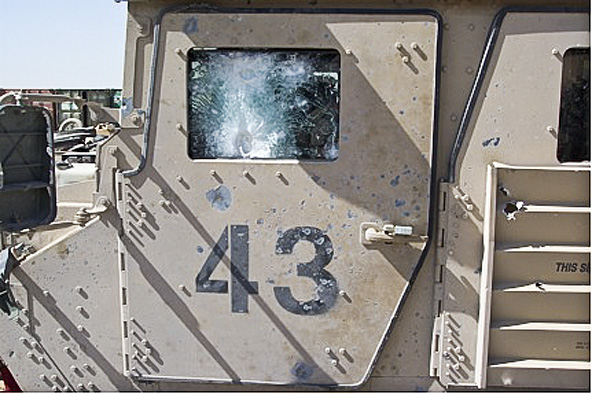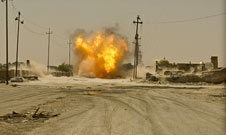
2004, Iraq. A damaged U.S. humvee. Captain Bose had a tour of duty which lined up exactly with the Mahdi Army uprising in Baghdad and Najaf.
Photo: courtesy, Sudip Bose
Bose, the brainy outsider, didn't seem excited about the Badiat mission. He skipped Melendrez's briefing and hung out in his room in his vast library of packaged food gifts from home. After noticing that the two men kept their distance, I began to think of Melendrez as the anti-Bose, a bearer of prejudices he couldn't beat, a man who was anything but detached. "You have to be hard with these people," he said to me, talking about the Iraqis. "That's what they understand." Bose would never fall prey to empty wisdom like Melendrez's comment about the Iraqis, even if he found them to be difficult patients. Bose often treated wounded fighters who came into the emergency room spitting and glaring at the doctors. "You could tell they didn't want to be there." It was the harshest comment he made about people who were working hard to kill and maim his friends. Melendrez, who has a short fuse, has much different feelings.
The next morning, guarded by three Bradleys, Melendrez's convoy made its careful way out to Badiat. We turned off the main road onto a dirt track, raising a comet's tail of dust. A stench came through the windows because we had entered a dump operated by freelance garbage men. Dunes of trash covered the open ground. On the other side of the rotting hills was Badiat. The first Iraqis we saw were middle aged men straightening rebar on saw horses. One older man took the bent rebar from a pile and worked the kinks out of it by hand, then put it in a few pile, he was dirty and the sweat ran down his face.
Melendrez got down out of the car, spoke to the rebar-straightener through an interpreter and asked for the local leader. "He's not here," the man said and glared at us. It probably wasn't true, but Melendrez was unfazed and decided to go on to the school. Half a mile down the road, the Bradleys set up a perimeter while Dean Stulz and his medics created a clinic. It took them about 20 minutes before they were ready to see patients. Since the soldiers couldn't tell the people of Badiat exactly when they were coming for fear of ambushes, citizens emerged from their houses, looking at the armored convoy with a mixture of apprehension and curiosity. A humvee with loudspeakers drove around town advertizing the clinic. At first they trickled in, but before long there were at least 150 people waiting for free medical care under the brutal sun.
The very sick arrived an hour and a half later, their families carrying them in somber processions. Lieutenant Dean Stulz, the steady Minnesotan who volunteered for the Badiat mission, saw more than forty patients in a three-hour period. I watched most of them come in to see him. The Iraqis filed into the clinic/classroom with various ailments, some life threatening, where they were treated or comforted and filed slowly out. One diabetic old man walked in with gangrene that had turned five fingers on his hands pitch black. Stulz would make an appeal for emergency surgery for this man when the convoy made it back to the base. Desperate parents brought him children with birth defects, heart murmurs. They kept coming, and Stulz saw them one after the other. Inside the clinic, there were spontaneous demonstrations of joy and gratitude for Stulz and his medics. Outside, however, tempers were fraying.
At the school gates, Melendrez and his soldiers struggled to maintain an orderly line of patients. The people from Badiat asked for water, and to get out of the blazing sun, but the soldiers were hesitant to let them inside the school because they didn't feel that they could control them. As midday approached, the mood of the crowd turned sour when the Iraqis realized that there was no way everyone could be seen before 12:30 deadline when the convoy was scheduled to leave. At least once, Melendrez threatened Iraqis trying to push their way past the gates with his baton. When he raised the baton, the crowd would edge back slightly. Women were pleading to get out of the sun, to see a doctor. They petitioned anyone within earshot who would listen. Melendrez finally lost his patience with the crowd and slammed the school gates closed. All the men and women were pushed out of the way, back into the street. It was difficult to watch.
I was outside, standing near the school, when a man named Ahmad Naif said that he wanted the Americans to go away. A young boy who lived nearby lifted his shirt and showed an old bullet wound he said he got from the US soldiers. "They thought I was an Ali Baba," he said proudly. Ali Baba is the universal term Iraqis use for thieves. Other men in the crowd said they didn't like the Americans, and at one point a crowd of young boys yelled at the soldiers to leave while their parents tried to silence them. A few minutes before the kids started up, Sargeant Robert Paul, a soldier assigned to a Civil Affairs unit, said, "The insurgents want to attack us and turn the mission into a failure, make it seem like we can't help anyone without getting people killed." Paul stood outside and looked at the restive crowd of Iraqis. "See that?" I saw only citizens waiting in the sun. "The ICDC are all inside the walls of the school. That's not good." Paul was right, the ICDC were all inside the school where it was comparatively safe.
Just before we left Badiat, the soldiers handed out candy and t-shirts. It was a mob scene. Kids, running, jumping, snatching things from each other. At 12:30 sharp, we climbed back into the vehicles. Back at the base, I fell into an exhausted sleep for the rest of the day.
Dr. Bose was awarded the Bronze Star for his bravery and service to his country. He is now practicing medicine in Chicago.
We remain friends to this day.
 LEAD IMAGE: 2004, Iraq. A roadside bomb detonating in Iraq, the cause of the majority of injuries to U.S. personnel in Iraq.
LEAD IMAGE: 2004, Iraq. A roadside bomb detonating in Iraq, the cause of the majority of injuries to U.S. personnel in Iraq.Photo: Sudip Bose
© Phillip Robertson, 2009-2014.
